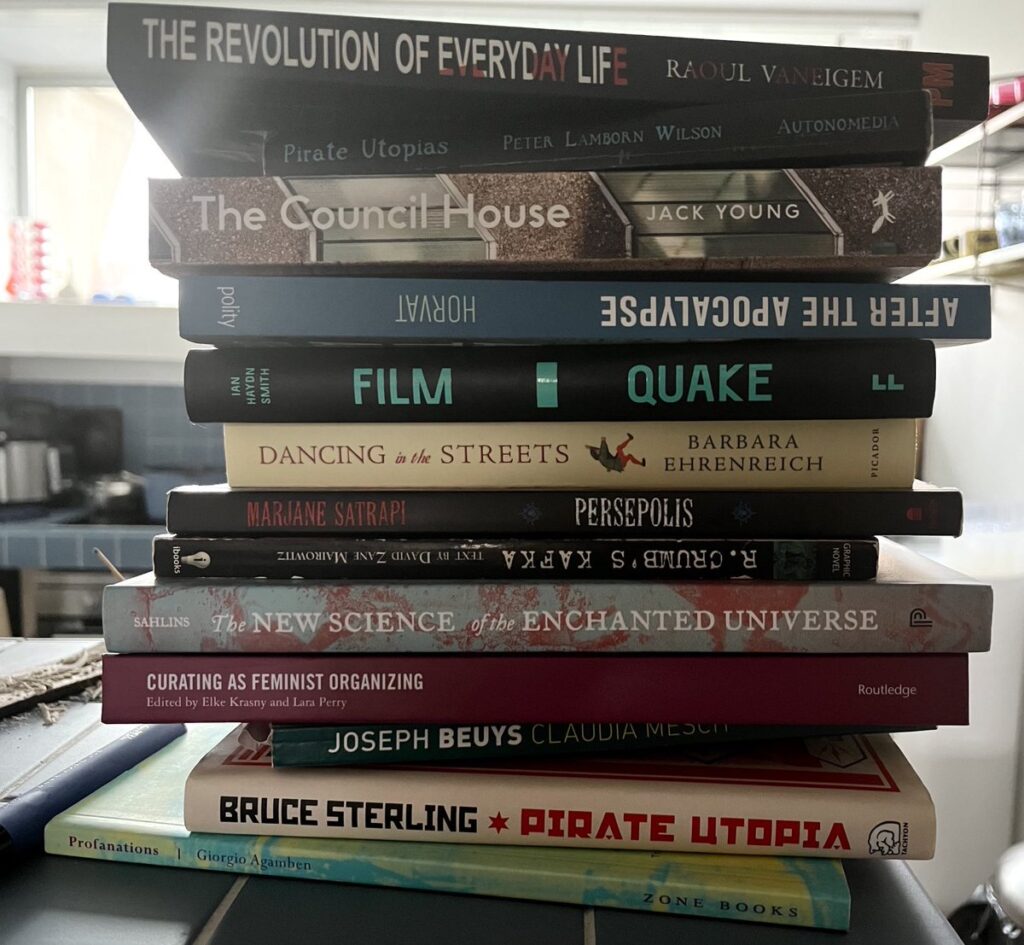This room is a meeting room for people who would like to share books they’ve read.You can suggest meeting topics and if there are more than 5-6 people willing to share stories about books they’ve read, we’ll organize a meeting.
“The Universe (that some call the Library) is composed of an undefined, maybe infinite number of hexagonal galleries.” Jorge Luis Borges
My first suggestion: let’s talk about books we are reading about magic in May.
You can write an email to me or to the Museum of Care (mail@museum.care).

These are the books I’m reading now and the stories I’m willing to share.
Meanwhile, Jamie Zawinski (a three-dimensional model of the Library of Babel created with Sketchup, 2016.) that I used as a main image for this room is reminiscent of Mastadon’s federated server design, where there is no main server, but everyone is connected to each other. Here is the David Graeber Institute Mastadon server https://graeber.social/
Please, sign up!
And here’s how the idea for this room came about:
Among other books, David and I were planning to write a little book about what Reading is all about and both were very fond of the Borges Library.
In part it had to do with our Jewish roots, but for me it also had to do with my Soviet childhood, in which books were the main deficit.
The Soviet Union had a strange system where people could turn in used paper to get coupons for cherished books by Marina Tsvetaeva, Bulgakov or Pasternak. In this way circulations of literature problematic for Soviet ideology were distributed mainly among enthusiasts. At the same time, an almost playful space was created in which people began to compete for the number of scarce books in their family libraries.
I remember turning in such paper, along with my beloved grandfather, in an effort to get a coupon to redeem some new books for the family library.
When I grew up, I learned about the existence of forbidden books, which, however, some brave people read and were even willing to talk about them.
I remember the first time I cut the pages of a unread book of plays by Maurice Maeterlinck in the Leningrad Theater Library, where my teacher, Vadim Igorevich Maksimov, worked. I was the first one to read this book, that was published before Russian Revolution.
People around me were constantly retelling books to each other, building up an endless Borgesian library in which each book grew into numerous interpretations and versions, and many worthy texts shared the great fate of folk songs, being reborn with each new rendition.
My experience of visiting the famous dissident cafe on the corner of Liteyny and Nevsky – Saigon – consisted of a small double coffee and a friend paraphrasing an unavailable Nabokov book, Malevich’s secret diaries, or Zinoviev, who was banned in the USSR.
This had its good points: after all, it is impossible to read all the books, so retelling them to each other is the best enjoyment.
The bad side is that select groups that arise around access to certain information begin to form sects in which, as in any closed groups, there is a vertical of power and, as a consequence, violence and stupidity.
The group spends more energy keeping others out and defending its difference from the rest, so it inevitably becomes dumb.
I saw so many such “initiated” idiots in the late Soviet Union!
That is why the Museum of Care is made as an open and transparent space, as protected as possible from secret conspiracies and backstabbing intrigues.

Meanwhile, Jamie Zawinski’s three-dimensional model of the Babylon Libra
![]()



